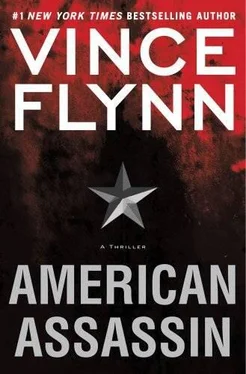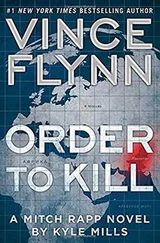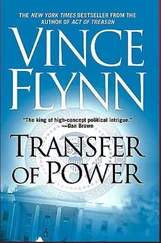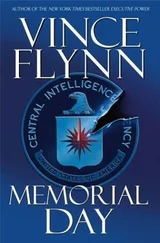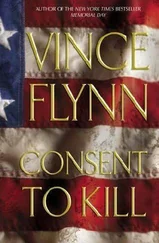Rapp could hazard a guess but he got the idea Ohlmeyer would prefer to do the talking. “Not really.”
“Because those supertankers don’t really care about you. They may lament your misfortune, but only briefly. The tanker, the ego of the captain, all comes before you. Think of it as the ship of state, if you will. You are young, and if you are lucky your career will last for another four decades. During that time your handlers will come and go and the political winds of change will reverse directions more times than you will be able to count, and sooner or later it is likely that someone within your own government will begin to think of you as a problem. Ships of state do not like to be embarrassed, and if that means sinking a small vessel every once in a while… well, that is a price they are willing to pay.”
Rapp had a bad feeling. He looked at the file and said, “What’s that all about?”
“It is your insurance policy.” Ohlmeyer opened the file and clipped to the first sheaf of documents was a Swiss passport. “Stan has assured me that your French is perfect.”
Rapp nodded.
“And your Italian, German, and Arabic?”
“My Italian is good, my German is weak, and my Arabic is pretty good.”
Ohlmeyer nodded. That matched with what Hurley had told him. “I have prepared three separate legends for you. Swiss”-he slid the set of documents out of the file, followed by two more. “French, and Italian. You will need to memorize everything in these files and, most important, you will need to visit Paris and Milan in the coming weeks.”
“Why?”
“You now own a safety deposit box in each city, and one in Zurich, but I will take care of that one for you. You will want to place certain things in these safety deposit boxes. Things that will help you survive should you need to go underground, as they say.”
Rapp frowned. “Does Stan know about this?”
“It was his idea. Mine as well, but we did the same thing for him years ago.” He slid over a blank sheet of paper with three names on it. The first two were French and the third was Italian. “Please practice signing each of these a few times before I have you sign the signature cards.”
Rapp took the pen and began practicing the name Paul Girard. “Why isn’t Stan handling this?”
“He does not want to know the details.”
“Why?”
“Because every man in your profession needs a few secrets.”
“Even from his own boss and government?”
“Especially from your boss and your government.”
Rapp was wondering how he was going to keep all of these different aliases straight. Hurley had already given him two, and here were three more. He practiced a few times on the other names and then signed the cards.
“In each box,” Ohlmeyer said, “will be twenty thousand dollars in cash, various documents, such as birth certificates, in case you lose the passport, and a matching set of credit cards and driver’s license. As I said, you will want to add certain things to each box, but you should talk to Stan about that. There is also a numbered account here in Switzerland that I will be administering.”
“A numbered account,” Rapp said, barely able to conceal his surprise.
“Yes, Stan has requested that as well, and told me that it is up to my discretion to release the funds.”
Rapp was tempted to ask the size of the account, but instead said, “May I ask you a personal question?”
Ohlmeyer nodded, with a smile, as if he already knew the question.
“Why are you doing this… helping us?”
“We will discuss it over dinner tonight, but the short answer is that I believe in freedom.”
“Freedom,” Rapp said as he turned the word over in his mind for a second. “That’s a pretty vague term.”
“Not really, but if it helps you understand my motivation, you’ll need to understand that I grew up in East Germany. I saw what the Soviets were really like.”
Rapp’s mind was filled with a menagerie of black-and-white atrocities, courtesy of the World at War shows he saw as a kid. “So you hate the Russians.”
Ohlmeyer gave a little laugh and said, “Let’s just say I believe in good guys and bad guys.”
HAMBURG, GERMANY
BY early afternoon they learned that Dorfman was dead. The news sent Ivanov into a fit of rage. He went on for a good five minutes, ranting that he had never trusted the man, which caused Shvets to silently ask himself why the fool had let a man he didn’t trust handle such a large sum of money. After that, Ivanov, whose job and nature was to be paranoid, spewed out no fewer than a dozen conspiracy theories in as many minutes. He was convinced that Dorfman had gotten drunk and whispered secrets in the wrong person’s ear. That this person had then decided to bump Dorfman off and take the money for himself. But then again, there were supposed to have been safeguards in place, so the criminals had to have had a certain level of sophistication.
Ivanov had a long list of enemies that he ran through. There was a Cuban general he’d screwed over in an information swap five years earlier. How that man could possibly fit into this scenario was beyond Shvets, but he’d asked for the list of possible suspects so he simply listened and let Ivanov purge the information from his vodka-soaked brain. There was a German industrialist whom he’d fleeced a year earlier, a Spanish tycoon as well, and then there were a host of Jews and Bolsheviks who had been out to get him for years. None of it appeared to be useful, but then again maybe it was.
Shvets took the information and boarded a Lufthansa flight to Hamburg. Before leaving he’d called their man at the consulate and told him to work his contacts with the local police and get him a copy of the crime scene report. When he arrived at five-thirty-six that evening, Petrov Sergeyevich was waiting for him, the report in hand. Shvets had met Petrov briefly a few years earlier. After a polite exchange, Shvets told him to drive him to the bank. He sat in the passenger seat and read the report. Herr Dorfman had been stabbed in the thigh and shot once in the head. His wife was found bound and gagged and locked in the basement. She reported two men wearing masks entering the house at approximately ten in the evening. She did not hear them speak and could not give police a description other than the fact that they were roughly the same size.
The dogs, strangely enough, were unharmed. One was locked in the basement with the wife and the other was found wandering around the first floor. At some point the latter dog stepped in the pool of blood by Dorfman’s head and then tracked it around the first floor. There was no sign of forced entry and none of the neighbors had seen a thing. Shvets found it interesting that the wife and dogs were unharmed. That more than likely ruled out the vying factions in Moscow, although if Shvets was advising them, he would have tried just this thing to throw off a man like Ivanov. Whoever they were dealing with was very professional.
Shvets finished the report, closed it, and decided it was nearly useless. Anything was possible. Dorfman could have told someone about the money and that someone could have gotten the idea in his head to steal it. Twenty-six million dollars could do that to certain people. Shvets had thought about it himself. He had the skill set to make it work. It would have been so much easier if Dorfman had stolen the money and tried to disappear. They would have tracked him down. They always did. The fools habitually ran off to some beachside resort where they naively thought they would blend in with the locals and tourists.
They reached the bank shortly after six-thirty and Shvets weighed the benefits of having Sergeyevich accompany him into the building. He decided against it. There was no need for muscle. At least not yet, he hoped, and besides, the fewer who knew about Ivanov’s vulnerable position the better. The bank was typical. Tall, covered in glass, and imposing, all meant to give the impression of stability and security. It was one of many things Shvets was counting on.
Читать дальше
